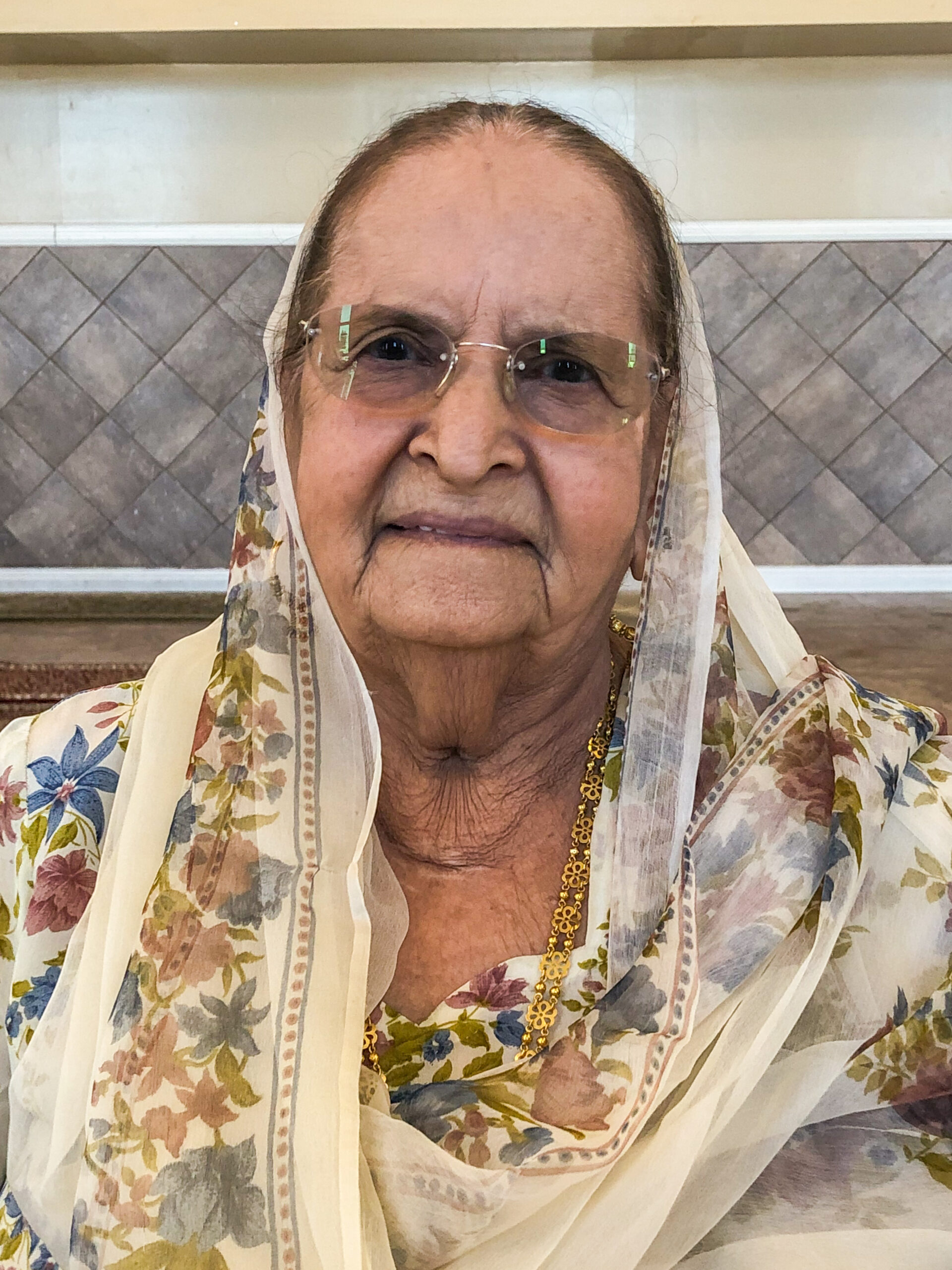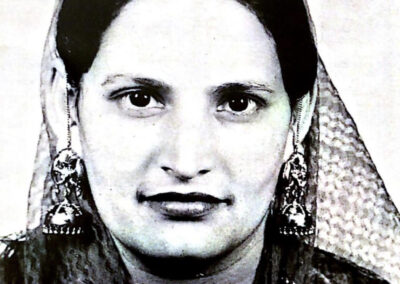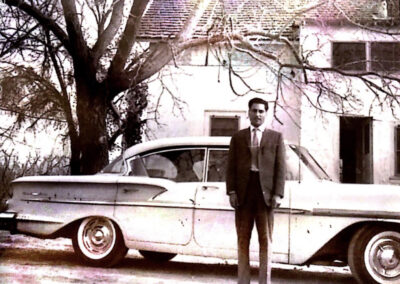Pritam Kaur Heir
Pritam Kaur Heir (born on February 24, 1930) was among the first cohort of Punjabi women to settle in Yuba City. She is also the only woman who has served on the Executive Committee of Yuba City’s Sikh Temple Gurdwara on Tierra Buena Road. She is known for openly speaking her mind regarding Gurdwara management decisions. She may have been one of the first people to bring the Guru Granth Sahib (Holy Scripture) to Yuba City when she arrived in 1953.
Born in the village of Gondpur, Hoshiarpur district, Punjab in British India, she was raised in an affluent Sikh farming family. She was unusual for her age in her educational attainment: she completed her high school degree in Punjab. Her father, Beant Singh, was a decorated soldier in the British Army. Her mother, Kartar Kaur, served as the sarpanch, the head of the village. Her father wanted his only child, Pritam, to become a judge.
Pritam immigrated to the United States in 1953, one year after marrying Sewa Singh Heir in Punjab. According to Mrs Heir, she traveled with her husband, as well as the Guru Granth Sahib, from Punjab through Europe to the tiny airport in Marysville, CA. Their journey lasted one week due to a long flight delay from Switzerland to London. Their TWA plane was unable to land in London due to a snowstorm, so they spent five days in Paris until they could resume their travel to California. They settled in Yuba City where her husband’s grandfather, Ganda Singh Heir, had settled decades earlier. They weathered many hardships, including losing her home and her belongings during the floods in 1986 and 1997. Pritam actively contributed to the success of her family’s farming business. She quickly learned to drive, and she performed all of the farming tasks, including spraying, pruning, harvesting, and hauling peaches and prunes in the truck she drove. She also managed the family accounts in the office.

Pritam Kaur Heir, Gurdwara, Yuba City, August 23, 2022. Photo by Nicole Ranganath.
Of all of the female Punjabi pioneers, Pritam stands out in her service to the Yuba City Gurdwara on Tierra Buena Road. She is an Amritdhari Sikh who brought the Sri Guru Granth Sahib (Holy Scripture) with her to Yuba City in 1953. Hers was one of the first Sikh scriptures in the area. Before the Gurdwara was built in the late 1960s, her home served as an informal Gurdwara where Sikhs would gather for prayers, kirtan, akhand paaths (continuous recitations of the holy book), and Sikh holidays. Her family served as founders and trustees for the Tierra Buena Gurdwara.
After the Gurdwara opened in 1970, she and her family contributed countless hours of seva (volunteer service). She was the only woman to serve on the Gurdwara’s Executive Committee for sixteen years. When an attorney met with the Gurdwara committee, he remarked, “You’re the only woman on the committee. You must be very brave.” She was not afraid to stand up to the male committee members. She attributes her temerity to her family: “I come from a very strong family.” Her family also gave a $1,000 donation to establish a library in the Gurdwara.
A woman with strong convictions, Pritam is especially proud of the role she played in keeping chairs and tables in the langar hall of the Gurdwara. She played a critical role in the “chair controversy” in US Gurdwaras. Whether or not to keep chairs and tables in the Gurdwara has been a divisive issue in North American Gurdwaras since the 1970s. For decades, the South Asian American community sat on chairs in the Stockton Gurdwara. However, as more Sikhs arrived from India after the 1965 Immigration Act, there was growing opposition to allowing chairs in the Gurdwara. The majority of Sikhs will only sit on the floor in the Gurdwara in observance of the core values of equality and humility. In the West, however, most Gurdwaras include seating for the elderly so that they can sit comfortably. Pritam Kaur Heir felt passionately that chairs should remain in the Gurdwara out of respect for the elders, as well as for the sevadars (volunteers) who prefer them. When there was an effort to remove the chairs from the langar hall (communal kitchen), she performed an all-night vigil sitting on a chair to prevent its removal. She organized other women to raise $3,600 to purchase tables and chairs that were installed in the Gurdwara. Today the Yuba City Gurdwara includes both seating arrangements.
For Yuba City’s annual nagar kirtan, Pritam is one of the sevadars who volunteer every day for months making preparations. Due to her special status at the Gurdwara and in the community, she sits on the main float next to the Guru Granth Sahib. She recalls her emotions sitting near the eternal Guru: “I felt very grateful to God. I felt very close to God.”
She is also the mother of five children (two boys and three daughters).
Photograph by Nicole Ranganath.
Interviews with Pritam Kaur Heir by Nicole Ranganath, Yuba City, November 22, 2019 and August 23, 2022.


